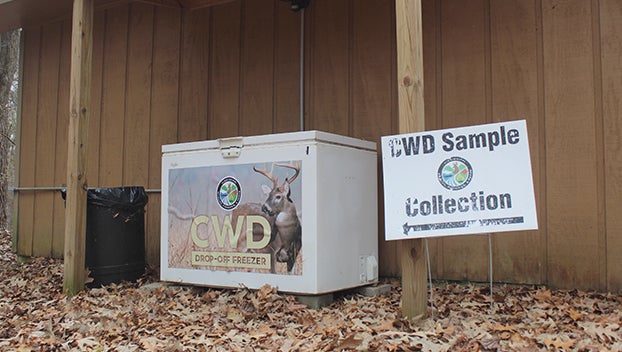Mississippi Chronic Wasting Disease samples starting to stream in
Published 9:24 am Thursday, September 28, 2023

- Chronic Wasting Disease samples must be submitted if you harvest a buck during velvet season. Sample coolers look like this one pictured here at Natchez State Park. (Hunter Cloud | The Natchez Democrat)
BROOKHAVEN — Chronic Wasting Disease samples are starting to stream in as Mississippi Department of Wildlife, Fisheries and Parks collects from taxidermists and freezer locations following the 2023 Velvet Season. Hunters have submitted 234 samples from velvet season as of 3:30 p.m. Wednesday but more could come in.
Velvet season is a special three day season where hunters can kill one legal buck using archery equipment and are required to report their harvest and submit a sample for CWD. Chronic Wasting Disease is an always fatal disease caused by an infectious prion.
Hunters killed 369 deer last year during the velvet season helping give a nice boost to the CWD sample collection to start the year. Samples submitted by hunters help fight against the disease and protect the resource.
Mississippi first detected the disease in February 2018. Since then, 207 deer have tested positive for the disease statewide. Last year, 80 deer tested positive for the disease. It is likely the longer Mississippi fights the disease the more positives will be detected each year as prevalence increases. Benton County in North Mississippi has the highest positive total with 127 positives. Lincoln County does not have a positive but that does not mean the disease is not there.
Bow season opens September 30 and hunters can continue to play a role in the surveillance for CWD. Participating taxidermists in Lincoln County can submit samples or visit the MSU Extension Office in Hazlehurst to submit samples.
To submit a sample for CWD, hunters should preserve the head with at least 6 inches of neck attached. Antlers and skull plate may be removed without affecting the lymph nodes used for testing. If antlers are not removed, they cannot be returned to the hunter.
Habitat managers and hunters can help in the fight against CWD by reading about the disease, stop the use of feeders and salt licks to reduce artificial congregation of deer and educate others. For more information about Chronic Wasting Disease visit MDWFP.com.





